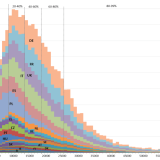Eurofound’s research aims to deepen understanding of the dynamics of labour markets across Europe, while informing policy to improve their functioning. Given the persistently high unemployment levels in some Member States, policies to support the reintegration of unemployed people into the labour market and those geared towards specific groups – young people, migrants, women or older unemployed – are of particular interest. Eurofound has produced a large body of work in this area, focusing in recent years on youth issues, gender and work, new forms of employment, mobility and migration, as well as wages.
Youth employment and entrepreneurship
Eurofound has explored the employment and social challenges faced by young people. Studies have examined issues around social inclusion and the need to take account of the diversity of vulnerable young people when developing policies to support them. It has also looked at youth entrepreneurship and the types of measures that have been effective in supporting it.
Gender and the labour market
Another research strand has highlighted the economic and social costs of the gender employment gap and assessed the effectiveness of policy measures promoting the labour market participation of women.
New forms of employment
An ongoing research strand examines new forms of employment that are different from traditional standard or non-standard employment and looks at their implications for working conditions and labour markets. Initial research into the typology was followed up with in-depth reviews of specific new forms of employment such as strategic employee sharing and ICT-based mobile work.
Migration and mobility of labour
Research on mobility has provided an up-to-date picture on the movement of labour within Europe and the effect of economic crises on migration.
Labour market transitions
Eurofound has also conducted in-depth analyses of various issues related to labour market transitions, including job tenure, temporary employment and transitions of young people from education into employment.





















